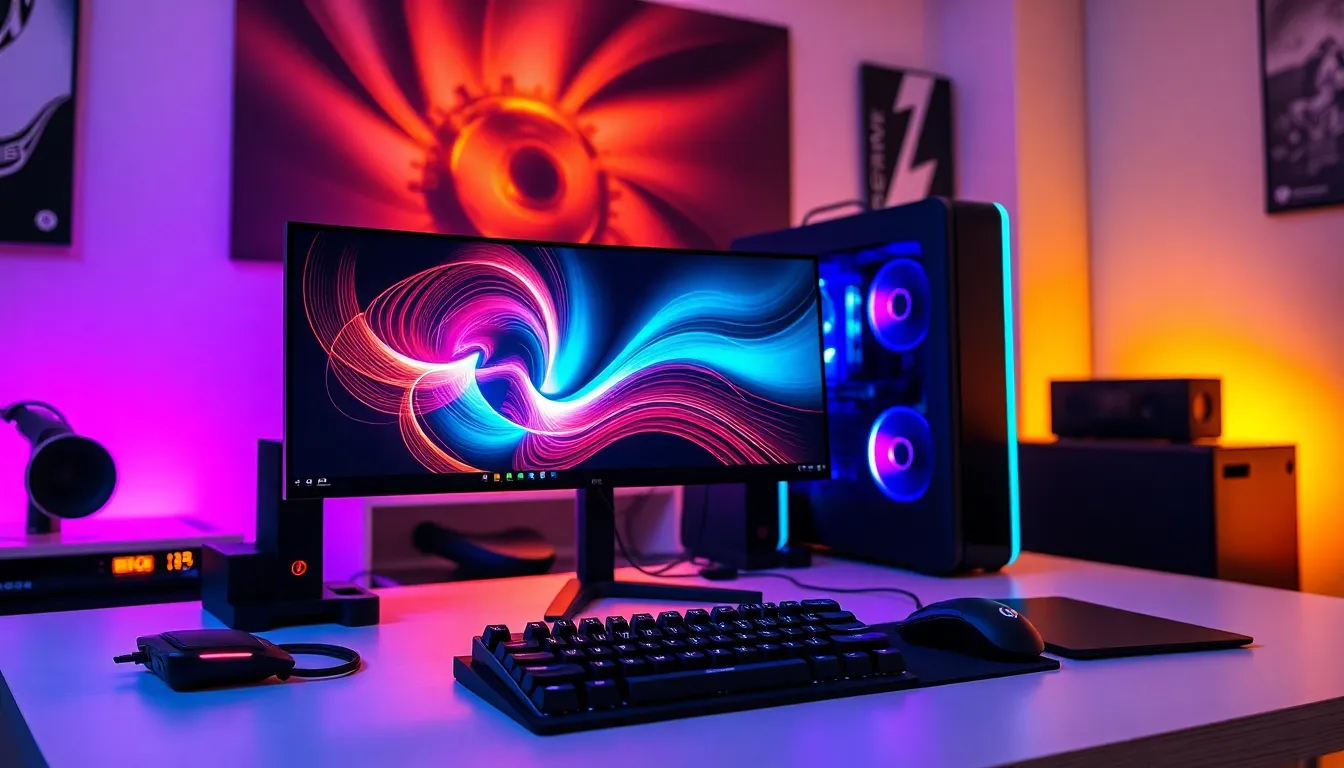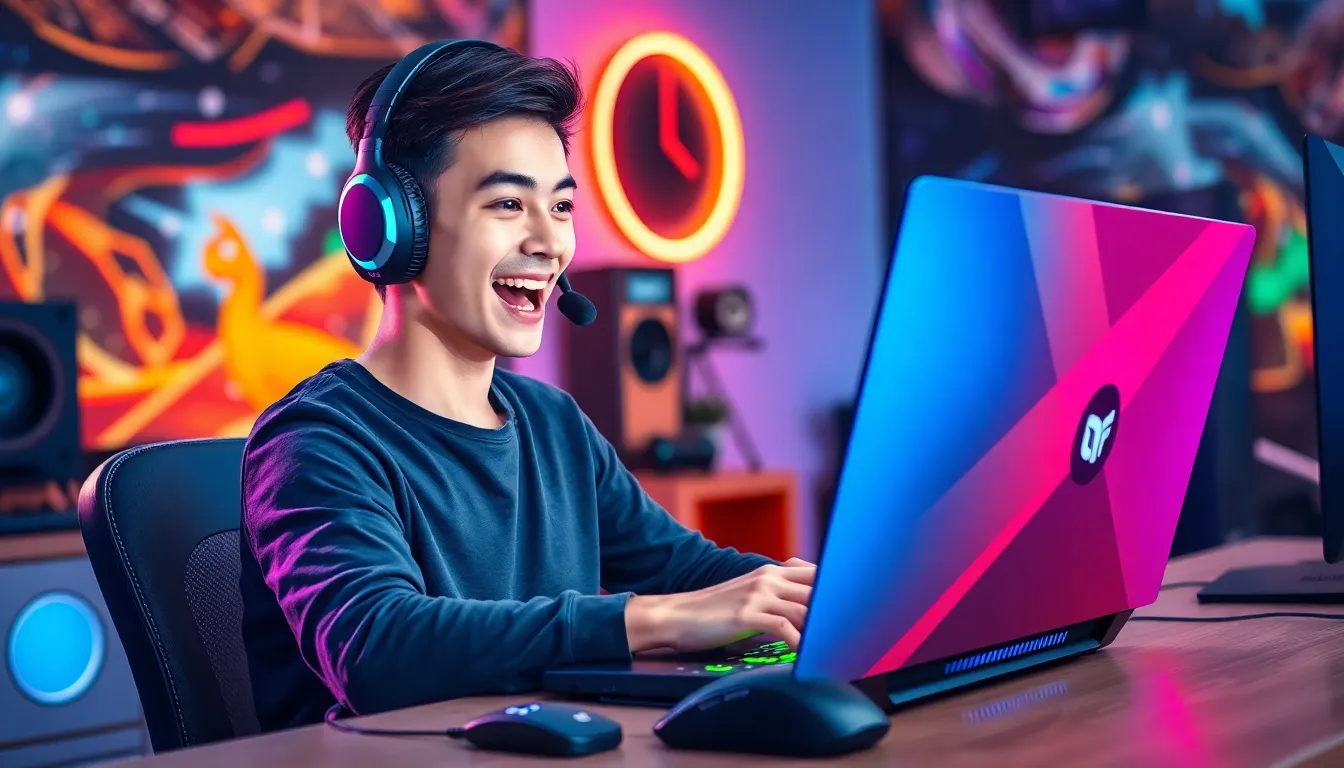In the epic showdown of gaming laptop vs PC, the stakes couldn’t be higher. Picture this: a sleek gaming laptop that fits snugly in a backpack, ready to conquer virtual worlds on the go. Now imagine a mighty desktop PC, a fortress of power that laughs in the face of demanding graphics. Both have their merits, but which one truly reigns supreme in the gaming arena?
As gamers weigh their options, the debate rages on. Is portability worth sacrificing raw power? Or does the customizable beast of a desktop win every time? Whether you’re a casual gamer or a hardcore enthusiast, understanding the pros and cons of each can save you from a gaming disaster. Buckle up for a humorous yet informative ride through the pixelated battlefield of gaming choices.
Gaming Laptop vs PC
Gaming laptops offer portability, allowing gamers to play on the go without missing a beat. With compact designs, these devices typically come with built-in batteries, making them suitable for travel. Consequently, users can enjoy their favorite games anywhere, whether it’s at a café, friend’s house, or during a long commute.
Desktop PCs, on the other hand, deliver superior performance and upgradeability. Equipped with powerful components, these machines can handle demanding graphics and multitasking with ease. Additionally, desktop PCs often include larger displays and customizable setups, which enhance the gaming experience.
In terms of price, gaming laptops tend to be more expensive than their desktop counterparts for similar specifications. This price difference stems from the engineering required to fit powerful hardware into a compact form factor. Desktops generally offer more power for the same investment, making them appealing to hardcore gamers.
Cooling systems in desktop PCs are typically more effective than those found in gaming laptops. Larger fans and improved airflow allow desktops to maintain optimal temperatures during intense gaming sessions. In contrast, gaming laptops may experience throttling if internal temperatures rise too high.
Upgradability sets desktop PCs apart significantly. Users can easily replace components like graphics cards, memory, and storage drives. Upgrading a laptop, however, often involves limited options, as many parts are soldered onto the motherboard.
Both gaming laptops and desktop PCs cater to different types of gamers, offering unique advantages and disadvantages. By considering factors like portability, performance, price, and upgrade options, gamers can make informed decisions that best suit their gaming lifestyle.
Performance Comparison

Performance plays a crucial role in the gaming experience, with processing power and graphics capabilities being key differentiators.
Processing Power
Desktops often boast superior processing power due to larger sizes that allow for advanced CPUs. These processing units typically run at higher clock speeds and can handle intense multitasking and gaming loads. Laptops, while more compact, utilize mobile processors that are less powerful when compared to their desktop counterparts. Overclocking is common in desktops, providing an extra boost for demanding tasks. Moreover, the thermal management in desktops enhances overall performance, reducing the likelihood of throttling under heavy loads. Gamers striving for efficiency often prefer desktops for their raw processing capabilities.
Graphics Capabilities
Graphics performance greatly affects gaming quality and enjoyment. Dedicated graphics cards in desktops usually outperform those found in laptops, producing higher frame rates and better visual fidelity. Laptop GPUs often sacrifice performance for portability, resulting in some compromises on graphical settings. More memory and better cooling in desktop graphics cards enable sustained high performance during intense gaming sessions. Many desktops support multiple GPU setups, allowing extreme customization for serious gamers. Ultimately, gamers seeking the best graphics experience often lean toward desktop PCs for their unmatched capabilities.
Portability and Design
Portability and design play significant roles in the gaming laptop vs PC debate. Gaming laptops excel in portability, allowing players to take their gaming experience anywhere.
Size and Weight
Laptops typically weigh between 4 to 6 pounds and range from 13 to 17 inches in size. Compact dimensions enable easy transport, fitting into most backpacks. Conversely, desktop PCs weigh much more, often exceeding 20 pounds, and require a dedicated space due to their larger footprint. Space considerations significantly impact mobility for gamers who travel frequently.
Aesthetic Appeal
Design elements contribute to the appeal of gaming laptops. Sleek, modern designs often feature customizable RGB lighting and stylish chassis. Visual aesthetics enhance the overall experience, attracting gamers who value style. Desktop PCs provide extensive customization options, allowing users to create personalized builds with unique components. While laptops offer a cohesive design, desktops promote individual expression through case modifications, leading to diverse looks according to user preferences.
Price Considerations
Price plays a crucial role in deciding between gaming laptops and desktop PCs. Both options come with distinct cost implications.
Initial Cost
Initial costs for gaming laptops generally exceed those of desktop PCs. High-end gaming laptops can range from $1,000 to $3,000, reflecting their compact design and advanced features. Desktop PCs, on the other hand, often offer similar specifications at lower prices, typically between $800 and $2,500. Factors affecting these costs include portability and engineering complexity in laptops. Buyers often pay a premium for the convenience of a gaming laptop. In contrast, desktops provide more performance for the dollar spent.
Long-Term Value
Long-term value varies significantly between these two gaming options. Desktops typically offer better longevity due to their upgradeability. Users can replace parts like graphics cards and CPUs to enhance performance over time. Gaming laptops often feature limited upgrade options and may require complete replacement after a few years. Additionally, desktop maintenance often costs less, allowing better investment returns. An efficient cooling system in desktops promotes longevity, reducing the need for repairs. In comparison, gaming laptops may face overheating issues, leading to shorter lifespans and additional expenses.
Gaming Experience
The gaming experience varies significantly between laptops and desktop PCs. Each system provides unique advantages that cater to different gamer needs.
Display Quality
Display quality greatly influences immersion in gameplay. Gaming laptops typically feature screens ranging from 60Hz to 144Hz, with some models supporting up to 240Hz for smoother visuals. Desktop PCs, however, often accommodate larger monitors that provide richer color accuracy and higher resolutions, reaching up to 4K. A desktop can support multiple monitor setups for enhanced field of view, improving the gaming experience further. Because gaming monitors can reach refresh rates beyond what most laptops offer, gamers seeking top-tier visual performance often prefer desktops. Ultimately, superior display capabilities directly impact the overall enjoyment of gaming.
Cooling Systems
Cooling systems play a critical role in maintaining performance. Desktops generally feature larger fans and additional cooling solutions, which effectively dissipate heat during intense gaming sessions, preventing throttling. Their spacious design allows superior airflow, ensuring components remain within optimal temperature ranges. Gaming laptops, on the other hand, use compact cooling systems that may struggle under heavy loads, often leading to performance drops. Many laptop models rely on thermal throttling to manage heat, which can diminish the gaming experience. As a result, gamers focused on long sessions may lean toward desktops for their more robust cooling capabilities.
Conclusion
Choosing between a gaming laptop and a desktop PC ultimately comes down to individual needs and preferences. For gamers who value portability and convenience a gaming laptop is an excellent choice. It allows them to enjoy gaming anywhere without sacrificing too much performance.
On the other hand those who prioritize power and upgradeability will find desktop PCs to be the better option. With superior processing capabilities and enhanced cooling systems desktops can deliver an unparalleled gaming experience.
Ultimately both options have their merits. Gamers should consider their gaming habits budget and desired performance to make the right choice for their gaming journey.

